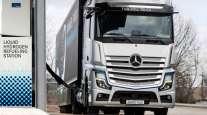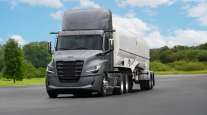DTNA to Spend $120 Million to Boost U.S. Production

This story appears in the Dec. 17 print edition of Transport Topics.
REDFORD, Mich. — Daimler Trucks North America said here Dec. 10 it will invest $120 million and add 115 union jobs to create two new assembly lines to make transmissions and turbochargers at its Detroit brand diesel engine plant.
On the same day, President Obama visited the plant to drum up support for his drive to increase taxes on higher-income Americans as part of his plan to resolve the federal budget crisis and praised Daimler for the new investment and jobs.
“Assembly lines are humming again,” Obama told several hundred cheering workers at this plant on the border with Detroit. “If you want to make the best cars and trucks in the world . . . you should invest in the United States of America.”
Earlier on Dec. 10, DTNA President Martin Daum told reporters the company would for the first time make transmissions outside of Germany, and would add an assembly line here to produce the new asymmetric turbocharger it will add to its new heavy-duty engines.
Daum said that by the time transmissions were rolling out of the plant in late 2015, as many as 250 new jobs — including 170 manufacturing positions — would be added to the plant, which is currently producing its Detroit brand diesel engines. The plant currently employs about 2,300 workers.
The move is part of Daum’s self-declared “mission to convert the North American truck market to automated manual transmissions,” which he said offer great fuel-efficiency gains over the manual units that currently dominate in the region.
DTNA already has announced plans to market a new AMT here designed for the higher highway speeds in North America, and has several customers trying them out. Currently, all Daimler truck transmissions are produced at a plant in Gaggenau, Germany.
Daum said planning already has begun on the Redford AMT line, which will have an initial capacity of 30,000 units per year.
He said even the best drivers should improve their fuel efficiency by 1.5% with automated manuals, while less-experienced drivers could see far greater improvements.
While AMTs have proven very popular in Europe, North American fleets have been slower to embrace them.
One of Daimler’s competitors, Volvo Trucks, has moved its production of its AMTs to its engine plant in Hagerstown, Md. (8-20, p. 31).
Daum said the decision to invest in the transmission assembly line presented Daimler with a “chicken-and-egg situation” — to wait to invest until there was sufficient demand to cover its costs, or to invest before the demand was there, in part to spur interest in the technology. “We decided that [investment in] the factory was the egg” and chose to invest the money now, he said.
The turbocharger assembly line is scheduled to open in the fourth quarter of 2014 and will produce units for the new DD12 and DD15 engines the company unveiled earlier this year.
Daum said, “I want short supply lines” for Freightliner and Western Star, the company’s two heavy-duty truck brands. “I want to reinforce that this is a North American truck.”
For Obama, it was a chance to trumpet another success in his campaign to boost U.S. manufacturing, one of the key points in his recent successful re-election campaign.
“I placed my bet on American workers,” he told the assembled workers. “We’re making progress; we’re moving in the right direction. We’re moving forward.”
A number of large manufacturers have announced plans to move more production to North America as transportation costs have risen — along with wages and benefits — in many other lower-cost countries.
Obama received the loudest applause when he waded into a pitched battle in Michigan over “right-to-work” legislation that was passed by the GOP-controlled state legislature. Such laws remove the requirement that workers in companies who benefit when the firms sign contracts with unions, but who chose not to join the union, still have to pay an amount to the union equivalent to dues.
“What we shouldn’t do is take away your right to bargain” for higher wages and improved working conditions, he said. “These so-called right-to-work laws, they don’t have to do with economics; they have everything to do with politics. What they’re really talking about is giving you the right to work for less money.”
Michigan Gov. Rick Snyder signed the legislation into law on Dec. 11.
Meanwhile, Daum said the decision to make the turbochargers in Redford was driven by an agreement with the United Auto Workers union on “operational and production flexibility” at the plant, as well as incentives provided by the state of Michigan and Redford Township.
The transmission assembly line will add 115 UAW jobs when it opens, Daum said.
“We have a very strong workforce here,” Daum told reporters, which he said helped the company decide to make the new investment.
Security and logistical issues caused by the president’s visit and the large entourage that travels with him shut down manufacturing activities at the sprawling, 75-year-old plant for the entire day.




